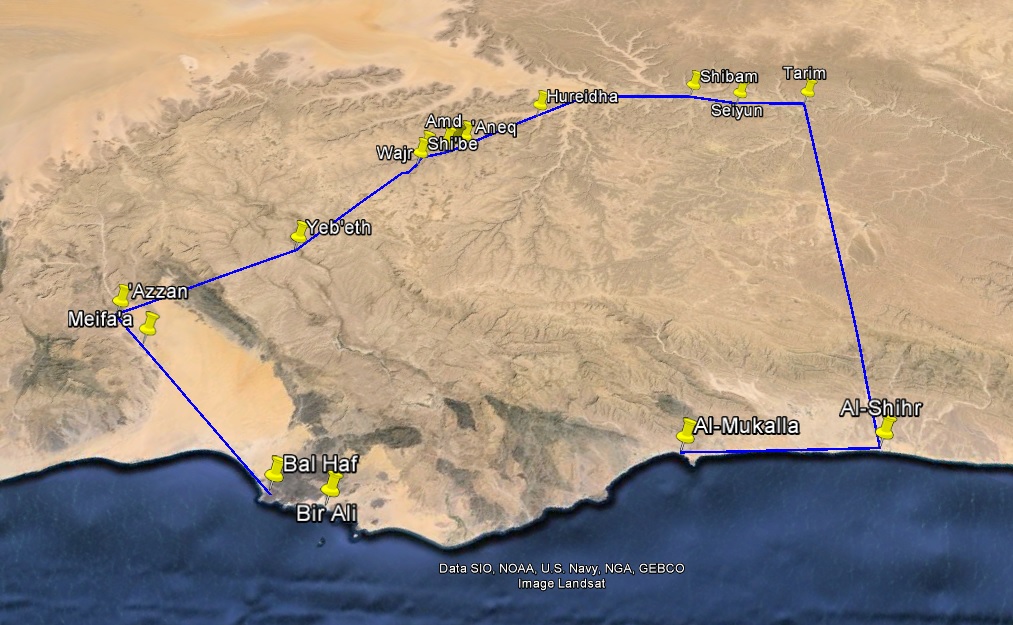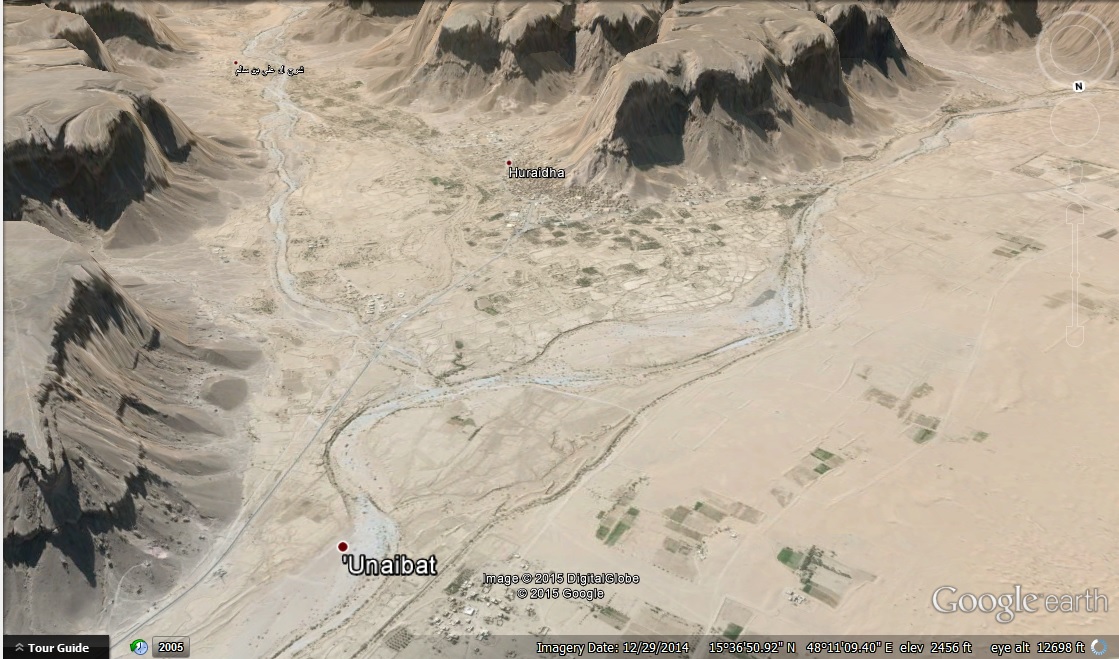"A Winter in Arabia"
This post is a review of the book A Winter in Arabia: A Journey Through Yemen by Dame Freya Stark. It was published in 1940 and describes a months-long visit she made to the Hadhramaut region of Yemen, a British protectorate at the time.
Winter is coming. Seventy eight years ago—a lifetime in the past—at this same time of year, three British women set off on an expedition (accompanied only by a handful of locals for their crew) into the heart of Hadhramaut, where few Europeans had been. The party included an archaeologist (unnamed in the book), a geologist (named Alinur), and Freya Stark, who led the expedition and wrote a book about it (and who had travelled there previously).
A Winter in Arabia is divided into three parts. The central part is Freya Stark's diary from the months in the village of Hureidha, which was the focus of the expedition. The archaeologist excavated a [pre-Islamic] temple there. Before the diary portion is a description of the journey to get to Hureidha, including sojourns in Tarim, Seiyun, and Shibam in the main Wadi Hadhramaut; following the diary is a description of Freya Stark's journey out of Hadhramaut. The day-to-day life in the village is where most of the observations of the local culture took place, as well as the actual research that was the purpose of the expedition.
The journey into Hureidha started in Al-Mukalla following a flight from Aden. The British had opened a road to Tarim, so the trip could be made by car. On her journey leaving Hureidha, Freya Stark opted to explore a much more difficult route, overland by camel to 'Azzan, and from there down to the coast and back to Aden by boat. I mapped the journey in Google Earth:

I'll mention here that such a journey would be very dangerous today (not to say that it was low-risk in the 1930s). The British government "advise against all travel to Yemen." And today the black flag is reported to fly over Al-Mukalla (which had the further misfortune of being hit by a hurricane last week).
At the time of Freya Stark's travels, however, Al-Mukalla was the post of a very capable British colonial administrator named Harold Ingrams and his wife Doreen. More on them later.
The official purpose of the expedition was research, which seems to have been a success. A small temple complex was successfully excavated near Hureidha. From its size, they concluded that the main route for the Frankincense trade did not pass near that village. Other research activities included collecting fossils (mainly of plants), photographing ancient (Himyaritic) inscriptions and cave drawings, mapping ancient irrigation works, and pressing flowers and otherwise identifying plants—the book includes an appendix that relates Arabic names of plants and trees with English and Latin names, produced in consultation with the Royal Botanic Gardens. One very common tree in Hadhramaut was the 'ilb. Freya Stark was very observant and kept good notes, even about travel times (by camel, naturally) between points of interest on the journey back from Hureidha. One other thing that was noted, was the depth to the water table: around 9 – 15 metres (in Wadi 'Amd). Some of the findings from this expedition were published in scholarly journals: see here and here.
The accomplishments of the expedition are even more impressive in light of the fact that Freya Stark and her companions were bedridden with illness for weeks out of the winter that they spent on site.
The book, especially the diary portion, also includes a lot of cultural and religious observations about life in Hadhramaut. The author and her companions were there during Ramadan and for the feast at its end. In Hadhramaut, there was a prominent sayyid class that claims descent from Mohammed and forms a sort of aristocracy. Divorce and remarriage were common:
"But surely," I said, "he can't marry the same wife again till someone else has married and divorced her?"
Sayyid 'Aluwi [who had married for love] looked troubled. "We do not follow that rule here," he said. "The fact is that the sayyids have made special arrangements among themselves so that they can marry cheaply and often—for there is very little else to do here. So they have made a rule by which no one can pay more than fourteen dollar (21s.) for a wife, and a virgin at that; one can spend sixty dollars or so on a wedding feast, but that is all. This makes it possible for them to marry as often as they like." (p. 144)
The book includes a description of the local court system (paying a judge to arbitrate a dispute, with input from elders), taxation (via impounding people's goats until they paid), superstitions (divining with arrows was still practiced there), food, and clothing. Beekeeping is a big deal there. Even while in the heart of Hadhramaut, Freya Stark was able to receive some mail, and she included a couple of cute anecdotes about some of the local people reading her magazines:
The small Ahmed this morning sat quietly in his corner, turning the pages of Punch with a running commentary—for these are the first images of human beings the children have ever seen on paper, and to them they are living people. "That man is smiling, God be merciful to him" (an advertisement for cigarettes): "That surely is not one of the children of Adam, I take refuge with God, it is a Jinn" (a lady in corsets): "And that is the Madame who digs"—he put his small finger on the image of a man and began to spit, hitting the page two feet away with remarkable accuracy, and inspired, I begin to hope, only by a dislike for trousers. (p.86)
Fatima, the Mansab's sister, has called to-day, and sat on the floor turning over the leaves of Vogue. It had just come, and I had not had the time to tear out two naked ladies advertising bath salts: I hastened to say that it is a paper exclusively circulated in harims.
"Are they real?" said she.
"Oh no," I said with relative truth: they had the improbable silhouette invented by advertisers. "They are just Jinn."
"Do they see them," she asked, much intrigued.
"No, but they think that is what they look like."
Fatima was overcome by the female beauty of Europe. The specimens of it provided in ourselves in Hureidha had evidently not made a particular impression. (p. 135–136)
One thing that was conspicuous by its absence was any mention of qat.
Here is a view of Hureidha from Google Earth:
On the journey back from Hureidha, Freya Stark travelled with some Beduin, whom she compares favourably with the peasants; they seemed less downtrodden. On a side note, this book is the only place I've seen "bedu" used as the singular for beduin in English. The book records some political discussions she has with some beduin about "Ingrams' peace". Harold Ingrams, the British colonial administrator, had forbidden tribal fighting, going as far as to bomb a tribe that had stolen 42 camels and refused to return them. He also worked hard to reopen the road to Tarim when a tribe blockaded it. For the most part, the people Freya Stark spoke with seemed to respect Harold Ingrams and his methods, as long as the ceasefire he imposed was going to be enforced on all:
"Are you one of the Ferangi," said [a bedu of Ba Qutmi tribe], "who are coming to make us free our slaves, and pay taxes, and to make our women do as they please?"
"I do not know," said I, "about the first two, but I know that your women do as they please already, because I am a woman myself."
He laughed and squatted down in the glow of the fire.
"All the jol [plateau] is talking," said he, "about your aeroplanes. The Sultan of 'Azzan told us they were coming, and none of us believed him; and they did come; and now you have come just after. What is it all about? Are you coming to spoil our country?"
"Indeed I hope not," said I.
"We have given up all our guns because of your English peace, and now the Sons of Himyar who live in the hills have stolen two of our camels a fortnight ago, and we Ba Qutmis have given up our guns." (A whole circle of German rifles with gleaming with smooth barrels round the fire.) "We have had enough of the peace, and soon we shall go into the lands of the Himyar and pour petrol over the roots of their palms. We do not like you." He smiled at me in a good-natured way as he spoke.
"We are going to have a kid for dinner," said I, "and you will like me better after that. In our country we think that a man never likes people till he is fed. But as for your country, we have no wish to take it from you." I looked over the vast lands tumbled in the moonlight and thought of English woods with blue-bells just coming. "We have a better land," said I. "And if we are here it is not to do you any harm, but because your sultans invited us, to keep out other people whom you and we both dislike."
"If that is so," said the Ba Qutmi, "why all is well. But if you make a peace, you should keep it, and not let the Sons of Himyar steal our camels." (p. 250)
Being the late 1930s, another political point that crops up is mentions of the Italians trying to stir up trouble.
The author must have been a formidable woman. In the introduction, she is described as someone who would rather ask forgiveness than permission:
For several years I had experience of Miss Stark when I was in the Ministry of the Interior in Iraq. The movements of ladies in some of the wilder parts of the country without permission was quite rightly restricted, and unauthorized visits to Persia were strictly forbidden. Miss Stark made light of such bureaucratic red tape; she saved our hair from premature greyness by just going and telling us all about it on her return. She exercised, in fact, on us the same qualities as she showed to the Arabs, and soon built up for herself a privileged position. (p.i)
She tried to conduct herself in the country according to a sort of prime directive:
Whatever happens, we may think of this with comfort—that in Hureidha no whirlwind will rise after our going, because of us. No vanity has been hurt, no comparison made evident, no alien mode of living has touched in its essentials the dignified economy of this little town: we have given money, but money has never been recognized as the mainspring of our dealings, degrading the minds of men. Nor have we lost in efficiency, so far as I can see. The time spent in pleasantness has harvested the love of all the countryside; even in immediate utility the expenditure seems worth while, and the sight of Alinur walking down the village street to her labours with a small imp hanging on each hand shows that the ordinary graces of life need not be divorced from the otherwise rather sterile paths of science. (p. 132)
Finally, I must say that the writing in this book is very evocative; Freya Stark was a keen observer and an excellent writer.
To travel from fortress to fortress, over the high jol where men still walk with guns upon their shoulders, and at the end of days to see before you land that is yet unknown—what enchantment in this world, I should like to know, is comparable to this? (p. 241)
